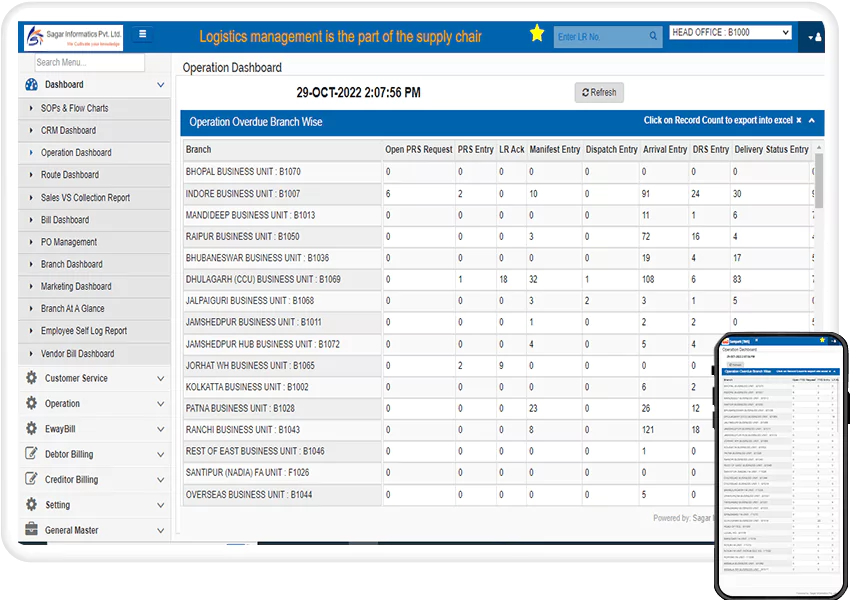

Solution to addresses the challenges faced by Transport industry
A cloud-based transport and fleet management software that facilitate business operations and deliver value each day. It helps businesses with supply chain issues, such as lost or delayed shipments. Using technology, the system can create shipping plans and forecasts, track shipments in real time to help optimize global shipping patterns and prevent delays, and automatically generate reports about every shipment. Here, SIPL brings best in class industry standards and practices for regulated operational control to scale your operations.
Striking Features of Logistics Management Software
Proof of delivery (POD) process creates documentation to verify that the goods have been received by the customer & help to ensure there is an agreement with the customer.
Route analysis enables you to design your own routes from scratch, or utilize routing algorithms to find efficient travel paths between locations.
TMS will let you see and utilize your assets on a single platform. You can assign drivers and equipment, plus manage dispatch and financial settlement for drivers.
The Powering accounting software integrates seamlessly with any financial system and handles complex claim documentation.
Order entering with automatic order recognition, order entry can be set up to include all necessary details. The current location and destination can be determined automatically.
TMS allows user to track real time, location and speed of vehicles from their desktop. It also allows user to review trip logs, report errors, and get alerts when there’s a problem.
What Your Existing Business Gains with Transportation Management Software?
Software is designed to improve warehouse productivity through the ability to perform auditing and reporting, accurate inventory management and tracking.
The financial factors of each logistical route, system will determine which is the most efficient. In areas like fuel efficiency and over time, it will offer cost-cutting solutions.
Transparency across the entire supply chain is possible with TMS solutions. Because data from all other integrated systems can be viewed and accessed in real-time.
It will connect the systems that manage orders, and those in charge of managing warehouses and consolidate customer orders into one platform.
TMS can reduce waiting times while ensuring high-quality transportation from one point to another by aligning dock schedules with deliveries.
It will reduce paperwork, staffing, and other costs associated with running your business while maintaining full control of your finances.
Frequently Asked Questions on Transportation Management Software (TMS)
A Transportation Management System (TMS) can significantly impact cost reduction and revenue growth for businesses. Here's how:
A TMS automates and optimizes various transportation processes, such as load planning, carrier selection, and route optimization. By efficiently managing these operations, a TMS minimizes manual errors, reduces inefficiencies, and ultimately lowers costs associated with transportation.
With a TMS, you gain better visibility and control over your entire transportation network. This lets you identify inefficiencies, eliminate bottlenecks, and optimize routes and shipment consolidation. You can minimize transportation expenses and maximize resource utilization by improving operational efficiency.
TMS systems provide access to extensive data on carriers, rates, and market trends. This information allows you to compare and select the most cost-effective pages, negotiate favorable rates, and optimize freight spend. Consequently, you can reduce transportation costs and allocate saved funds to other revenue-generating activities.
A TMS enables better communication and collaboration with carriers, suppliers, and customers. Real-time tracking, accurate ETA predictions, and proactive exception management help ensure timely deliveries and customer satisfaction. Satisfied customers lead to repeat business, positive word-of-mouth, and revenue growth.
TMS systems provide valuable insights through analytics and reporting capabilities. You can identify trends, spot cost-saving opportunities, and make informed decisions by analyzing transportation data. These data-driven decisions help optimize operations, reduce costs, and unlock potential revenue growth avenues.
Typically, transportation costs are a significant expense in the supply chain. Fortunately, the Transportation Management System (TMS) solution may assist in cost management and increase revenue. Depending on where you are with your digital transformation, automating transport planning and execution procedures will enhance your capacity to maximize anything from sourcing choices to carrier and route options.
Integrated cost-to-serve determination features in transportation management solutions will help find and reduce cost inefficiencies.TMS offers an extensive range of flexible, highly configurable and extensible solutions. TMS is the solution that enables you to expand your services and offerings to your customers while maximizing your revenue.
Transportation Management Systems (TMS) are utilized by various organizations across various industries. Here are some examples of who uses TMS systems:
Manufacturing companies and distributors often rely on TMS systems to manage their inbound and outbound transportation operations. They use TMS to optimize load planning, carrier selection, and delivery schedules, ensuring efficient movement of goods between suppliers, warehouses, and customers.
Brick-and-mortar and online retailers leverage TMS systems to handle their complex logistics needs. TMS helps manage inventory replenishment, order fulfillment, and last-mile delivery, ensuring timely and cost-effective supply chain operations.
3PL companies specialize in managing logistics and transportation for other businesses. TMS systems play a crucial role in their operations, enabling them to streamline freight management and carrier collaboration and provide value-added services to their clients.
Freight forwarders and brokers act as intermediaries between shippers and carriers. They utilize TMS systems to manage freight booking, track shipments, and ensure smooth coordination between multiple parties involved in the transportation process.
Transportation companies, including carriers and trucking companies, employ TMS systems to optimize their fleet operations, route planning, load optimization, and driver management. TMS helps them improve efficiency, reduce empty miles, and enhance customer service.
Supply chain managers, logistics coordinators, and transportation analysts within organizations utilize TMS systems to gain visibility, analyze data, and make informed decisions related to transportation and logistics. TMS provides them with valuable tools and insights for effective supply chain management.
In essence, TMS systems are utilized by manufacturers, distributors, retailers, e-commerce businesses, 3PL providers, freight forwarders, carriers, and logistics professionals across industries. It is a versatile tool that optimizes transportation operations, improves efficiency, and enables effective supply chain management for various organizations.
The adoption of Transportation Management Systems (TMS) has been steadily increasing as companies recognize the value and benefits it brings to their logistics operations. While it is difficult to provide an exact number, TMS usage is widespread across industries and company sizes.
Maximize Logistics Efficiency with Courier Management Software
Acquire our high-tech products and services for your business without any delay